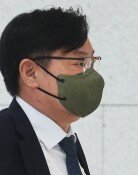Cho Kuk’s appointment leaves bad precedents
Cho Kuk’s appointment leaves bad precedents
Posted September. 11, 2019 07:35,
Updated September. 11, 2019 07:35
The government and the ruling party had set out bizarre and illogical arguments to save Cho Kuk, who was at last appointed as justice minister on Monday. This raises concern that bad precedents, generated through the twist and distortion of a system’s original purpose, will be accepted and considered as natural. Such an act is in disregard of the public, filled with despair and anger at controversies over Cho’s allegations.
President Moon Jae-in said Monday that no illegal actions on Cho’s part were proven during the hearing, providing reasons for him to push ahead with the appointment. However, confirmation hearings are not for the National Assembly to find physical evidence of illegalities. These are steps where lawmakers check and decide whether a candidate has morality and capabilities suitable for a public post with heavy responsibility, and what serves as criteria during this process is the public’s expectation.
Some 20 candidates have resigned following confirmation hearings since the system was first introduced. Only a few of them did resign because illegal acts on their part were revealed; most of them had to step down due to negative public sentiment or issues related to themselves or their relatives. Similar cases have been already observed during the Moon Jae-in administration. If you put this as criteria, Cho had more reasons than any other candidates to be rejected. If President Moon’s comment serves as a precedent, there will be no reason to hold confirmation hearings any longer. It is the prosecution’s duty to decide whether illegal acts were committed or not, based on specific evidence and proof.
It would make another dangerous precedent if suspicions of a candidate’s perjury at hearings go unaddressed. During the hearing, Cho said that it was his father who had registered his daughter’s birth, but what was written on the basic certificate issued by the Family Relations Register was “father,” indicating it was Cho himself who registered the birth of his daughter. Cho explained that there must have been an administrative mistake, but this is not enough to clear him of the suspicions. Yet, there is currently no regulation to punish a candidate for committing perjury at confirmation hearings. This may not be the problem of Cho alone, and we need measures to complement the system.
Another bad precedent was made when the former law professor held a press conference by himself with the help of the ruling party. Unilaterally bringing reporters together citing stalled negotiations at the National Assembly is also an act in disregard of the nation’s lawmakers. Such a political trick that destroys due procedures should not be used again. Cho is the second official who was appointed as justice minister after serving as senior presidential secretary for civil affairs, following Kwon Jae-jin, who was assigned to the post by former President Lee Myung-bak in 2011. Such practice should not repeat itself. The prosecution also needs to refrain from launching investigations into the family of a candidate ahead of a hearing.
Cho’s appointment has not stitched up the social division, but opened a new one. Leaving the aftermath of Cho’s appointment aside, bad precedents, if cemented by politicians disregarding the existing system and framing the issues as conflicts between the right and the left, will shake the foundation of democracy and the rule of law. We should protect social norms based on law, principle, and common sense from collapsing further.
Headline News
- Med professors announce intention to leave hospitals starting Thursday
- Bridge honoring Sgt. Moon Jae-sik unveiled in Pennsylvania
- Chief of Staff Chung tells presidential secretaries to stay away from politics
- US FTC bans noncompete agreements
- N. Korea launches cyberattacks on S. Korea's defense companies







